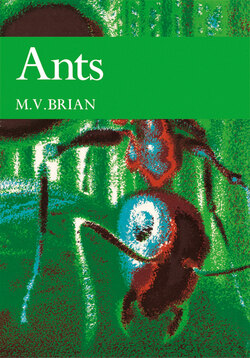Читать книгу Ants - M. V. Brian - Страница 8
EDITORS’ PREFACE
ОглавлениеThis series has always tried to give a balanced and authoritative account of a subject of interest to the general reader who is concerned with the countryside, and who wishes to know more about its fauna and flora. In Dr M. V. Brian we have an author who is recognized as the foremost authority in Britain on ants. Over a period of nearly thirty years, first as a lecturer in zoology in the University of Glasgow, and since 1953 with the Nature Conservancy at Furzebrook Research Station in Dorset, he has studied social insects in general and ants in particular. His most intensive studies in recent years have been on the heathlands of southern England, but he is also familiar with the species restricted to other parts of the country. He has written more than seventy original scientific papers describing his research, and has clearly contributed greatly to the advancement of knowledge of this group.
Since biblical days, ants have interested the general public as well as the specialist entomologist. The insects’ apparent industry has endeared them to the moralist, and has been equated with virtue and prudence in the fables of many cultures. Parables based on ants are thus widespread, not only in scripture but in the tales of such writers as Aesop and La Fontaine. This has given rise to a general belief that ants are beneficial insects whose presence should always be encouraged. On the other hand gardeners from their own observations may be more doubtful, particularly when ants invade and infest their houses. Picnickers in our woods who sit near – or even on – an ant hill may feel rather differently. All country dwellers are aware of ants, but few have any accurate information on the subject, and many widely accepted legends have little foundation in fact. We believe that this book will therefore fill a real demand, by giving the sort of information that has so far been difficult to obtain.
Dr Brian draws continually in his text on his personal experiences and on the brilliant investigation he himself has made. At the same time he would be the first to insist that no one person could do more than a fraction of the research necessary for the writing of a book like this. He clearly has to depend on the work of many others, and the reader will notice that though he treats others’ findings with the same rigorous criticism he reserves for his own observations, he also gives them the fullest credit when it is deserved. He has therefore produced a readable and informative book which describes the nature and behaviour of ants and their importance in the ecology of our countryside.
